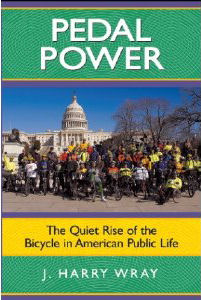Review of
Pedal Power, the Quiet Rise of the Bicycle in American Life
By J. Harry Wray
I purchased this book at the 2008 National Bicycle Summit (conference and congressional lobbying event), where the author spoke. He inscribed my copy:
“John – Pedal on! We skipped over the 20th century to take over the 21st. J. Harry Wray”
OK, that’s a friendly inscription, so I’ll tell you what I like best about the book first. It gets most interesting about one-third of the way through, with vignettes of individuals and organizations involved in bicycling and bicycling advocacy. You could
- follow several Chicago-area utility bicyclists on their daily commutes and errands;
- learn what motivates bicycling advocacy honcho Randy Neufeld,
- visit with a group of counterculture types who ride around Chicago on bicycles and glean most of their material possessions from dumpsters,
- read pocket biographies of politicians who champion bicycling causes, including members of the U.S. Congress,
- Read some useful descriptions of the history and workings of various local and national bicyclists’ advocacy organizations.
and more.
But now, backpedaling to the start of the book: Wray’s discussion of car/bike cultural differences wanders far from bicycling and from hard fact. Culturally-mediated perceptions are so important to him that he literally holds Ptolemaic (flat-earth-centered) and Copernican (round-earth, sun-centered) astronomy equally valid (see page 11). Let’s recall that one major goal of scientific and historical research is to refine perception. Wray clearly is not cognizant of bicycling research literature, and he draws some unsupported conclusions e.g., that special bicycle traffic signals increase efficiency and safety. In fact, special signals increase safety only if they are obeyed. They more usually reduce efficiency, and then often are not obeyed. Wray is weak on data which would, for example, quite certainly refute the statement on page 24, “I am absolutely serious about feeling less vulnerable to some violent act on a bicycle than in a car.”
Page 30 begins a chapter discussing bicycling in Amsterdam, where scofflaw bicyclists, as Wray acknowledges, are the norm. They serve the same traffic-calming function that scofflaw pedestrians commonly do in crowded cities. But Wray doesn’t address an important difference, that North American, British and French cyclists more generally expect a climate of equal rights and responsibilities as vehicle operators, making for a huge difference in advocacy goals.
The following chapter covers – take a deep breath – American materialism, individualism, inequality, capital punishment, the lack of guaranteed health care, the weakness of the labor movement, television watched alone, mass consumerism, the Super Bowl as a national religious rite, and the American dream of a house with a fenced backyard with a patio, and car. (I’d turn to James Howard Kunstler for a more compelling discussion of such topics.)
Wray predicts a resulting “culture storm”. Time will tell whether his claim is prophetic. In any case, only the last paragraph of this entire chapter is about bicycling!
Then there’s the useful stuff in the middle of the book, followed at the end by a couple more chapters about global warming, ill effects of motor vehicle use, and societal benefits of bicycling.
Also, Wray and his editors got on my nerves rather quickly by way of sprawling sentences, poor grammar and incorrect word usage. There are some real howlers — here’s one from page 17: “[S]truggling up the mountain, the smell of pine was unmistakeable and exhilarating” — this from a tenured university professor! Wray’s sloppiness with language can lead to confusion, not only eye-rolling. He, for example, frequently uses the word “bike” instead of “bicycle” even when misreporting a proper name, for example “Congressional Bike Caucus” and “San Francisco Bike Coalition.” He calls the Cyclists’ Touring Club (U.K.) the “Bicycle Touring Club”.
And so on.
Enough. I like Jeff Mapes’s book Pedaling Revolution better, and I’ll be reviewing it soon. (Now reviewed)

